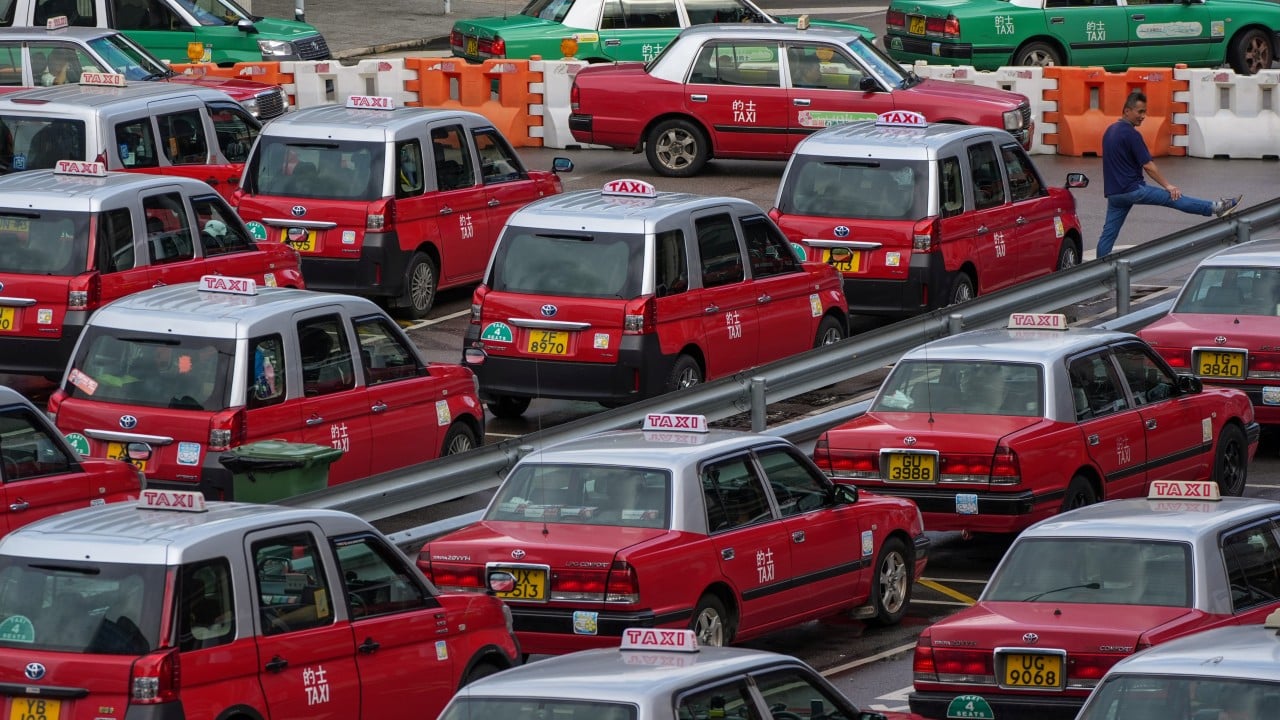Explainer | Hong Kong’s new taxi fleet operators tell how their services line up on the starting grid
Five Hong Kong bidders from a field of 15 have taken the chequered flag in a bid to run new taxi fleets the government hopes will reinvent the industry and improve service.
Big Boss Taxi Company, CMG Fleet Management, Sino Development (International), SynCab Service and Tai Wo Management have all been successful in tenders for premium cab services.
But only SynCab will be able to introduce services by September. The rest will have to be up and running by the deadline of next July.
The Post reveals their plans for the future as they rev up on the starting grid.
1. Who are the players?
Three of the successful operators have experience in the taxi trade, including the Sino Development (International) Company, which counts industry union the Taxi Drivers and Operators Association as a major shareholder.
SynCab includes Chung Shing Taxi, a city cab company set up in the 1970s.
The other taxi operator is Tai Wo Management, backed by “King of Taxis” Ng Fong, a director of top taxi operator Tai Wo Motors.
The fourth licence holder is Big Boss Taxi Company, a consortium that includes CTBus director Dobbie Cheng Wai-ping as a shareholder.
CTBus is a coach service established in 1973. Other members of the consortium include taxi owners’ groups.
One of CMG Fleet Management’s shareholders is City Motor Holdings, which owns subsidiaries that offer taxi and coach services. It also has links with Hong Kong’s app-based logistics platform GoGoX.

The company may also have to spend extra to secure their taxi licences.
SynCab said it planned to invest more than HK$300 million (US$38.4 million), half on its hardware and HK$7 million on driver training.
Director Sonia Cheng Man-yee told a radio show on Thursday that she hoped the business could break even in the five-year licence period.
Big Boss Taxi Company declined to provide an estimate, but fleet manager Eric Cheung Ping-kong said the firm had spent at least HK$120 million on new vehicles before they bought luxury and wheelchair taxis, which are more expensive than standard cabs.
The fleet manager added the firm would also spend even more cash on equipment for each taxi in the fleet.
2. How much will they invest?
Sino Development’s fleet operation manager Wong Tai-hoi said it had invested tens of millions of dollars in the business operation and will spend another HK$300 million (US$38.4 million) to buy electric vehicles.
The company may also have to spend extra to secure their taxi licences.
SynCab said it planned to invest more than HK$300 million, half on its hardware and HK$7 million on driver training.
Big Boss Taxi Company declined to provide an estimate, but Cheng said the firm had spent at least HK$120 million on new vehicles before they bought luxury and wheelchair taxis, which are more expensive than standard cabs.
The fleet manager added the firm would also spend even more cash on equipment for each taxi in the fleet.
3. How many premium taxis will the five fleets offer?
Sino Development plans to buy 1,000 electric vehicles from mainland China, including 100 luxury cars and 100 wheelchair-accessible ones.
SynCab plans to run 500 six-seat cabs, including 350 new vehicles with Wi-fi and USB charging services.
Cheung said his firm wanted to have around 300 cars on the road by the end of their first year, including 30 luxury taxis and 30 wheelchair ones.
Tai Wo said it would provide more information in the future and promised to strive to offer a professional and reliable service.
CMG Fleet Management said it had nothing to add at the moment, but that its preparations continued.
The government has stipulated that the fleets provide online booking channels on mobile applications and websites, as well as e-payment options and CCTV systems in their cabs.

4. How many drivers will they hire?
Sino Development, with a fleet of 1,000 vehicles, said it hoped to hire 2,000 drivers to cover morning and night shifts.
They will get a basic salary as well as performance-related payments.
SynCab said it had hired more than 50 drivers and would launch a recruitment drive to build a team of more than 450.
Director Cheng added that the operator would assess the drivers’ driving performance and service attitude.
Big Boss Taxi said it hoped to hire at least 30 full-time drivers at first.
The company said the rest of the fleet would be operated by drivers who would rent taxis before the firm expanded its recruitment later.
5. What are their edges in competing with each other?
Premium fleet operators have to provide training to fleet drivers, monitor their driving behaviour and offer customer service hotlines as part of the government’s mandate.
SynCab said its premium service would debut in September, with fares estimated to be 10 to 25 per cent more expensive than present taxi charges.
It added it planned to introduce more than 120 new vehicles by the end of the year.
Cheng said the taxi fleets would not necessarily compete, adding SynCab would explore collaborating with other operators, such as whether to share the same booking platform.
Big Boss Taxi said its artificial intelligence-backed management system would be able to reduce disputes between customers and drivers as trip records and other operational information would be recorded for easy tracing if needed.
Sino Development told the Post its strategy involved offering employee benefits and pensions to its drivers.
It added it would maximise its service by hiring part-time staff to cover drivers on leave.


